ApexCharger MACH 1 EV Charger Review
The ApexCharger MACH 1 EV Charger is a 48-amp Level 2 EV charger featuring J1772 compatibility, built-in Wi-Fi and Bluetooth, smart app control, NEMA 14-50 or hardwired installation, and Tesla support via the included NACS adapter.
This is my hands-on review of the ApexCharger MACH 1 EV Charger – a high-output, feature-rich 48 Amp Level 2 EV charger aimed at both home and light commercial use. Over the past decade, I’ve tested dozens of home EVSEs – from budget units to advanced smart EV chargers, and the MACH 1 stands out as a heavy-duty, future-proof option with standout smart EV charging and EV charging safety features at a competitive price.
I installed and tested the ApexCharger MACH 1 Level 2 EV Charger in both NEMA 14-50 and hardwired installations. I compared it with the company’s other models – including the ApexCharger MACH 2 and ApexCharger MACH 3 – as well as with premium home EV charger competitors like the Autel Maxcharger (which offers similar safety features), Grizzl-E Smart, and Wallbox Pulsar Plus. My evaluation focused on performance, build quality, smart features, and how the MACH 1 stacks up against other leading EV chargers on the market.
Summary
The ApexCharger MACH 1 EV Charger is a serious Level 2 EV charger for drivers who want speed, smart features, and installation flexibility. With up to 48 amps of power, Wi-Fi and Bluetooth connectivity, RFID access control, and an extra-long 30-foot cable, it’s built to meet the needs of households with multiple EVs or commercial users. The included ApexCharger PRO 1 connector (J1772 to Tesla Adapter) makes the MACH 1 EV charger fully universal charging both J1772 and NACS compatible EVs, while the robust weatherproof housing and anti-theft features ensure peace of mind indoors or outdoors.
This is not a barebones charger. It’s a fully featured EVSE designed for long-term use, and it delivers on performance, safety, and user experience.
Why You Should Consider the ApexCharger MACH 1 EV Charger
The ApexCharger MACH 1 EV Charger is a high-speed, plug-and-play charging station built for broad EV compatibility, supporting both J1772 and NACS EVs. Whether you’re charging a Jeep 4xe, Tesla Model Y, Ford Mustang Mach-E, Hyundai Ioniq 5, or Chevy Bolt, the MACH 1 delivers reliable performance right out of the box. It includes both J1772 and NACS charging support via the included ApexCharger PRO 1 (J1772 to Tesla) adapter.
It offers smart scheduling and energy monitoring via the Smart Life mobile app, which helps you manage charging during off-peak hours and potentially lower your energy costs. This is especially useful in TOU (Time-of-Use) utility regions.
With its included hardwire kit and a NEMA 14-50 plug, you have two installation paths: hardwire it for the full 48 amps (11.5 kW), or plug it into a standard 240V 14-50 outlet for up to 40 amps. Either way, installation is straightforward, and ApexCharger includes all the fittings and anti-theft hardware.
The charger also comes with two RFID access cards, allowing you to restrict usage if desired – ideal for shared garages, rental properties, or small businesses.
ApexCharger MACH 1 EV Charger holds CSA, ENERGY STAR, ETL, FCC certifications, and it is tested to UL safety standards.
ApexCharger MACH 1 EV Charger Specs & Features
- Voltage: 200–240V, Level 2
- Amps: Up to 48A (adjustable via app and display)
- Installation: NEMA 14-50 plug or hardwire (both supported)
- Connectors: J1772 + PRO 1 NACS adapter (included)
- Cable Length: 30 feet, heavy-duty, tangle-resistant
- Display: 2.4-inch full-color LED
- Smart Features: Wi-Fi, Bluetooth, Smart Life App, energy tracking, scheduled charging
- Access Control: 2 RFID cards
- Certifications: ETL, FCC, Energy Star, UL 2594:2022, CSA C22.2#280
- Weatherproof Rating: Indoor/outdoor rated enclosure
- Warranty & Support: 5-year warranty + 24/7 live customer support
ApexCharger MACH 1 EV Charger Build Quality & Design
The ApexCharger MACH 1 EV Charger feels built to last. The housing is robust and weather-resistant, and the cable is among the thickest and most durable I’ve tested—yet remains flexible enough to work in colder conditions. The design is modern and functional, with a clear, user-friendly display and subtle LED indicators for status, faults, and power. The included cable holster is well-designed and keeps everything tidy when not in use.
Unlike many units in this class, the MACH 1 includes all required fittings, mounts, and even anti-theft hardware right in the box – a nice touch that shows attention to detail.
ApexCharger MACH 1 EV Charger Installation
Installing the ApexCharger MACH 1 EV Charger is refreshingly straightforward, with support for both plug-in and hardwired setups. The unit is preconfigured for either option, and its internal circuitry automatically detects and adapts to the input voltage. ApexCharger provides a detailed installation manual, and for those who prefer a professional touch, ApexCharger partners with vetted installers like Qmerit and UPA Partners, offering trusted installation services across the U.S.
ApexCharger MACH 1 EV Charger NEMA 14-50 Installation
For plug-in ApexCharger MACH 1 EV Charger installation, we recommend using an industrial-grade NEMA 14-50 outlet, drawing up to 40 amps continuous loads on a 240V circuit. ApexCharger recommends using a 50A dedicated EV charger circuit breaker with GFCI protection and making sure the amperage is adjusted to 40A using the current button or the app, which complies with the latest NEC 625 standards. The installation requires 6 AWG copper wires and proper EV charger earthing to ensure reliable and safe operation as shown in our ApexCharger MACH 1 EV Charger NEMA 14-50 circuit wiring diagram below. This method is ideal for homeowners seeking flexibility or future portability.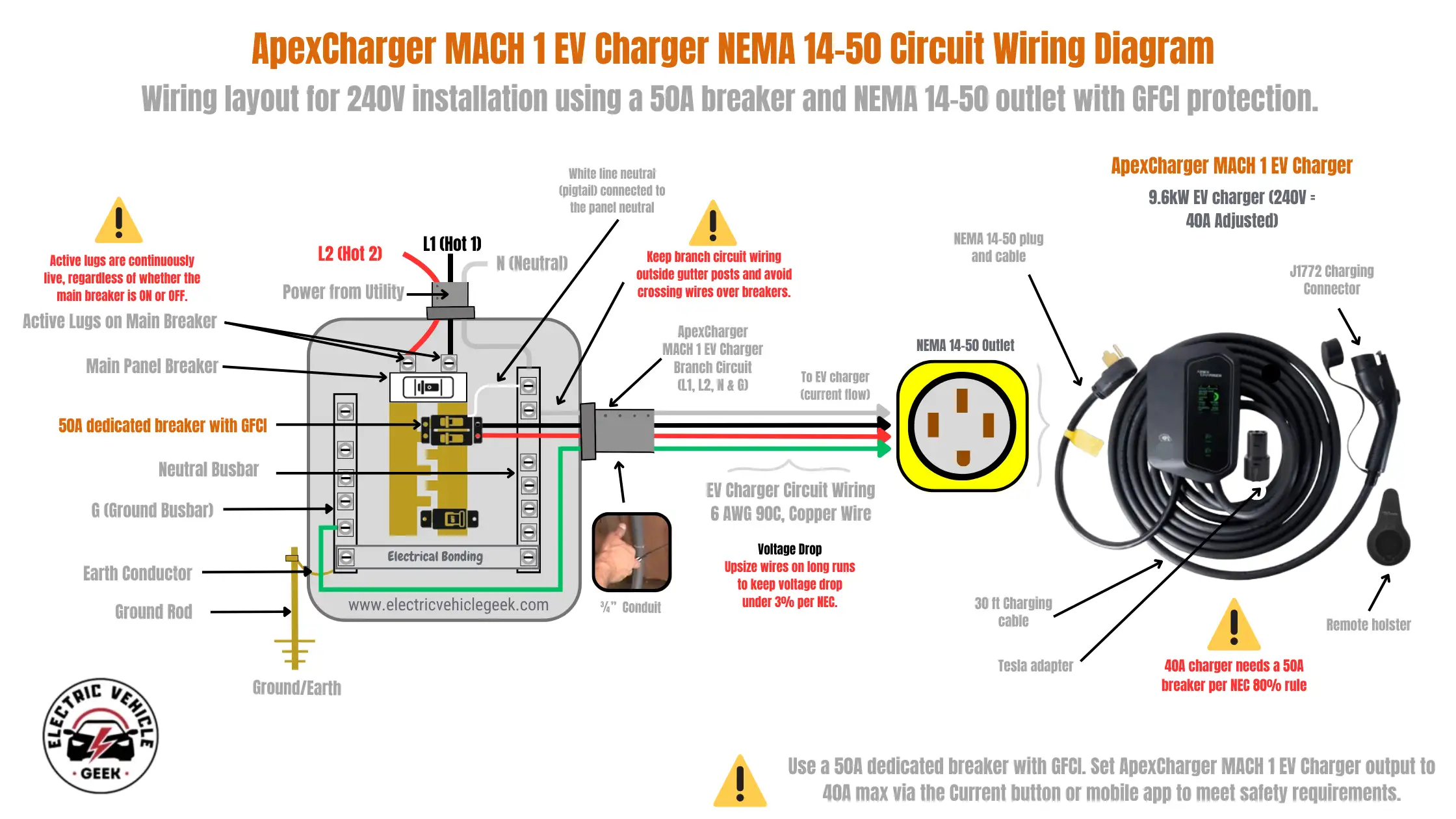
ApexCharger MACH 1 EV Charger Hardwired Installation
For a permanent setup, the ApexCharger MACH 1 EV Charger can be hardwired to deliver the full 48 amps of charging power. This configuration calls for a 60A dedicated breaker, 4 AWG copper wiring, and proper bonded grounding at the main panel as shown in our hardwired ApexCharger MACH 1 EV charger circuit wiring diagram below: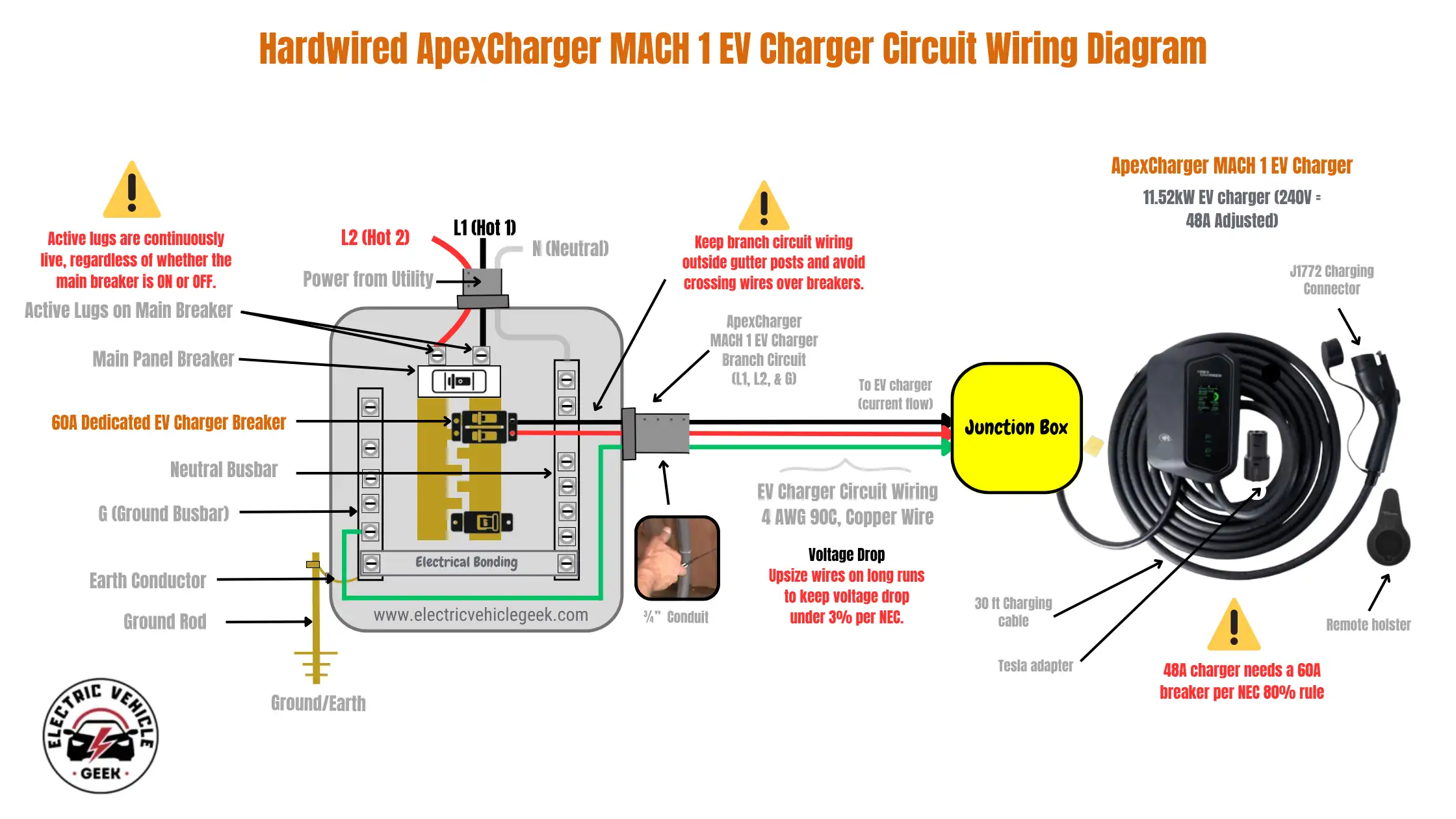
All required fittings and mounting hardware are included in the box, along with a hardwiring kit and clear instructions. This option is best suited for long-term installations or commercial use where maximum power and durability are essential.
Surge Protection for ApexCharger MACH 1 EV Charger Installations
Although the ApexCharger MACH 1 EV charger includes built-in surge protection, it’s not designed to disconnect the circuit quickly enough during a high-energy surge, nor is it rated to handle the extreme voltages and currents that can occur in high-amperage EV charging systems.
For comprehensive protection, we recommend installing a separate, properly rated Type 2 surge protection device (SPD). You have two NEC-compliant options: install a whole-house SPD at the main panel or add a dedicated SPD to the ApexCharger MACH 1 circuit. A dedicated SPD is especially important when the charger is installed on a detached subpanel, in surge-prone areas, or in applications where uptime and equipment reliability are critical.
See also:
- EV Charger Surge Protection Guide – covers NEC-compliant SPD installations and best practices
- EV Charger Surge Protection Devices – a curated list of SPD options rated for 240V EV circuits
Whole-house Surge Protection for ApexCharger MACH 1 EV Charger Installations
For most ApexCharger MACH 1 installations in a typical U.S. home, whole-house surge protection is the recommended first line of defense. A Type 2 surge protection device (SPD), rated for 120/240V split-phase systems and equipped with four terminals (L1, L2, Neutral, and Ground), should be installed near the main panel breaker. It connects through a dedicated double-pole breaker positioned close to both the main breaker and the dedicated circuit breaker for the ApexCharger MACH 1, as illustrated in the wiring diagrams below.
For plug-in setups, the 4-wire (L1, L2, N, and Ground) SPD device connects to L1, L2, Neutral, and Ground to provide full protection to all downstream circuits, including the 50 A ApexCharger MACH 1 EV charger branch circuit, against both external surges (e.g., lightning, utility switching) and internal surges (e.g., large appliance startups).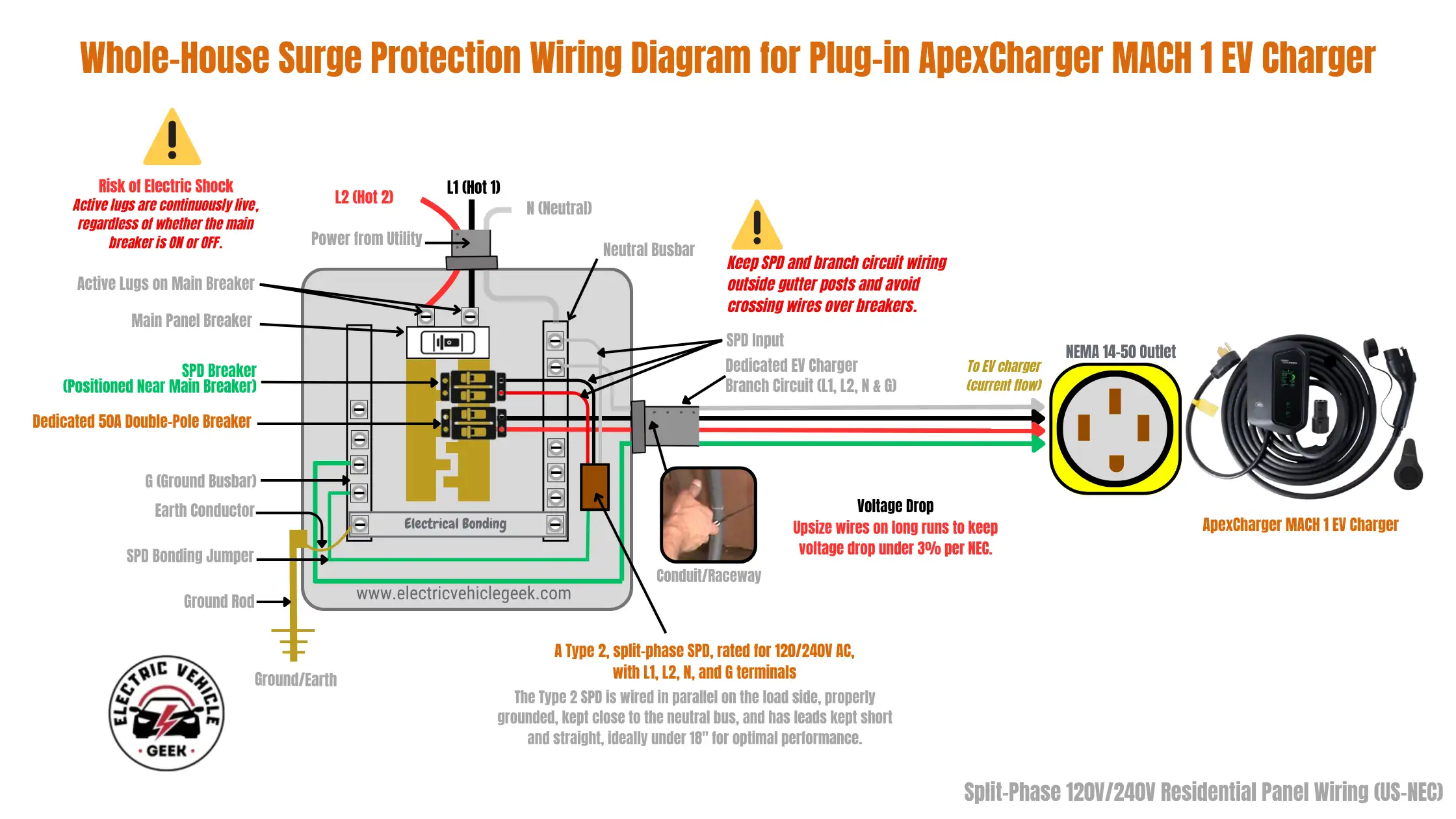
For hardwired ApexCharger MACH 1 installations that do not include a neutral conductor in the branch circuit, a 4-wire SPD is still used. In this case, the SPD’s neutral conductor is terminated on the panel’s neutral busbar, as shown in the wiring diagram below, while the 60A hardwired ApexCharger MACH 1 branch circuit itself includes only L1, L2, and Ground. This configuration ensures the SPD still monitors and protects the full 120/240V system, even though the hardwired ApexCharger MACH 1 charger operates on a 3-wire feed branch circuit.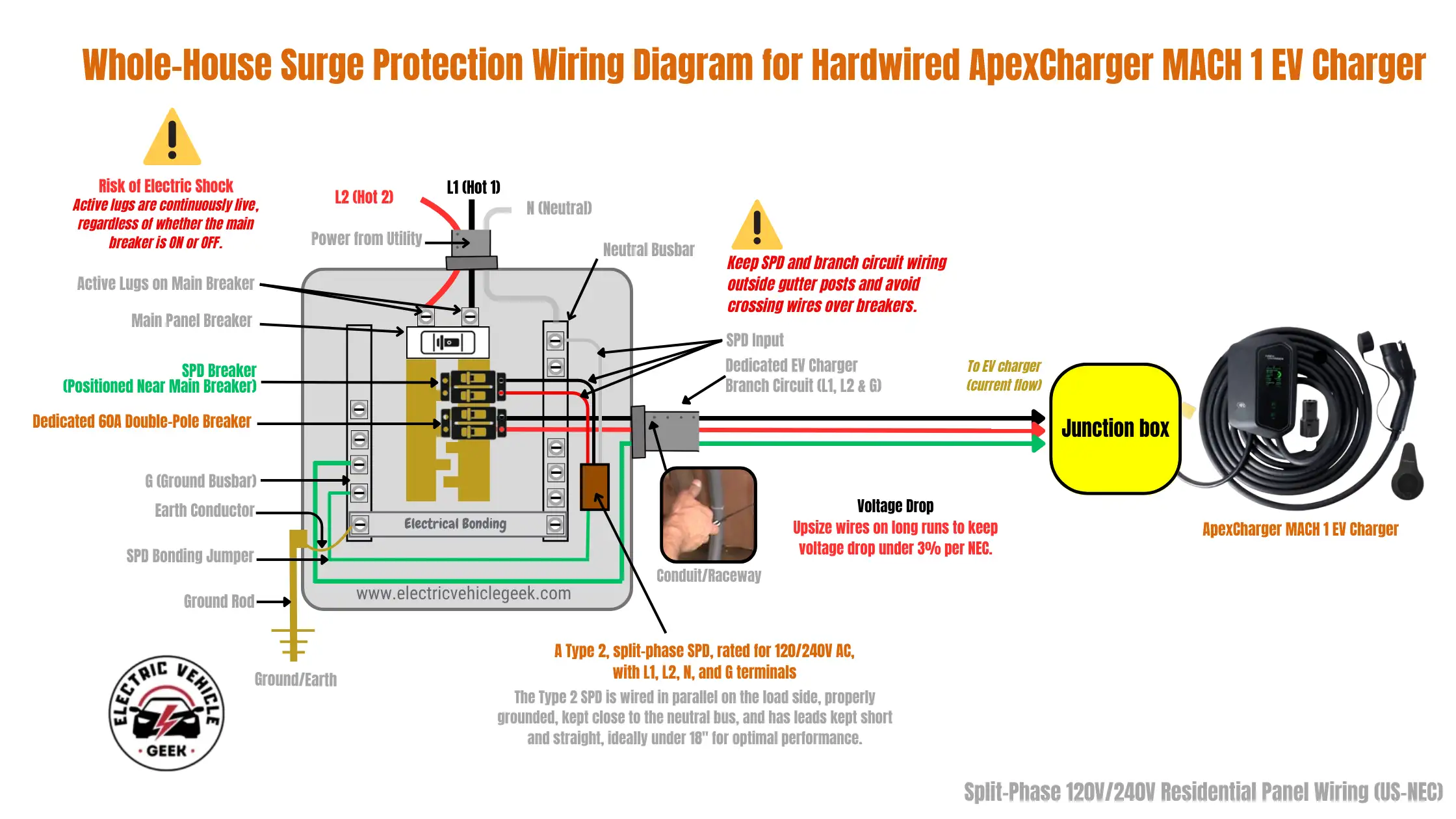
Dedicated Surge Protection for ApexCharger MACH 1 EV Charger Installations
When installed on a subpanel or when the main panel lacks available space, a dedicated SPD offers targeted protection for the ApexCharger MACH 1’s branch circuit. This setup is especially recommended for garages, carports, or commercial environments where electrical isolation and resilience are required.
For plug-in configurations, a 4-wire (L1, L2, Neutral, and Ground) Type 2 SPD is installed in parallel to protect the dedicated 50A branch circuit feeding the NEMA 14-50 outlet. This circuit includes L1 (red), L2 (black), Neutral (white), and Ground (green).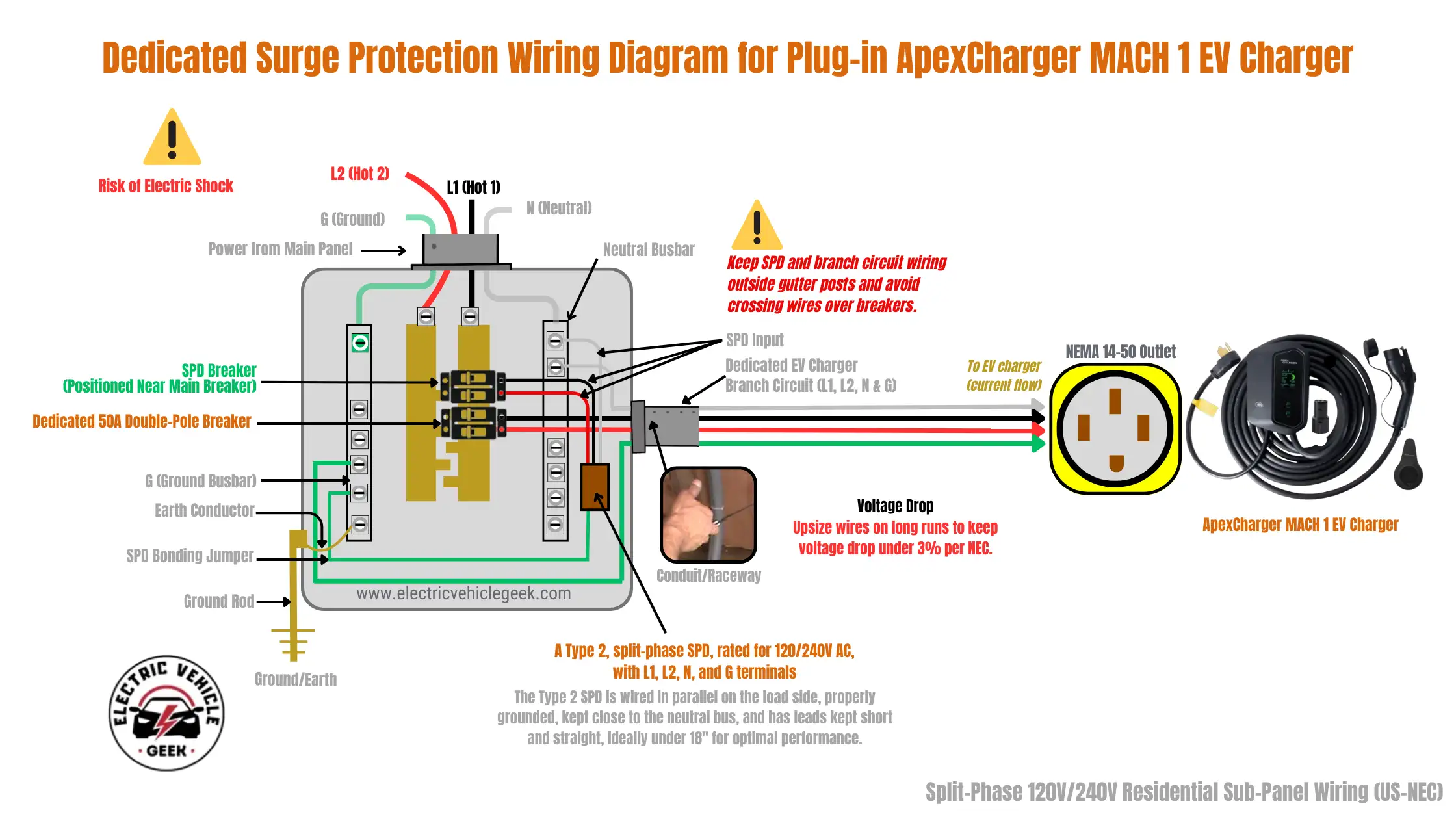
As shown in the dedicated surge protection wiring diagram for the plug-in ApexCharger MACH 1 EV Charger above, the 4-wire (L1, L2, Neutral, and Ground) Type 2 SPD connects to its dedicated double-pole breaker within the subpanel, with the neutral and ground wires terminated on their respective busbars. For optimal surge protection, the SPD leads should be kept as straight and as short as possible, ideally under 18 inches.
For hardwired ApexCharger MACH 1 EV charger setups that require dedicated surge protection, a 3-wire (L1, L2, and Ground) Type 2 SPD is installed near the dedicated 60A EV charger circuit breaker to protect the charger’s branch circuit, as shown in the wiring diagram below.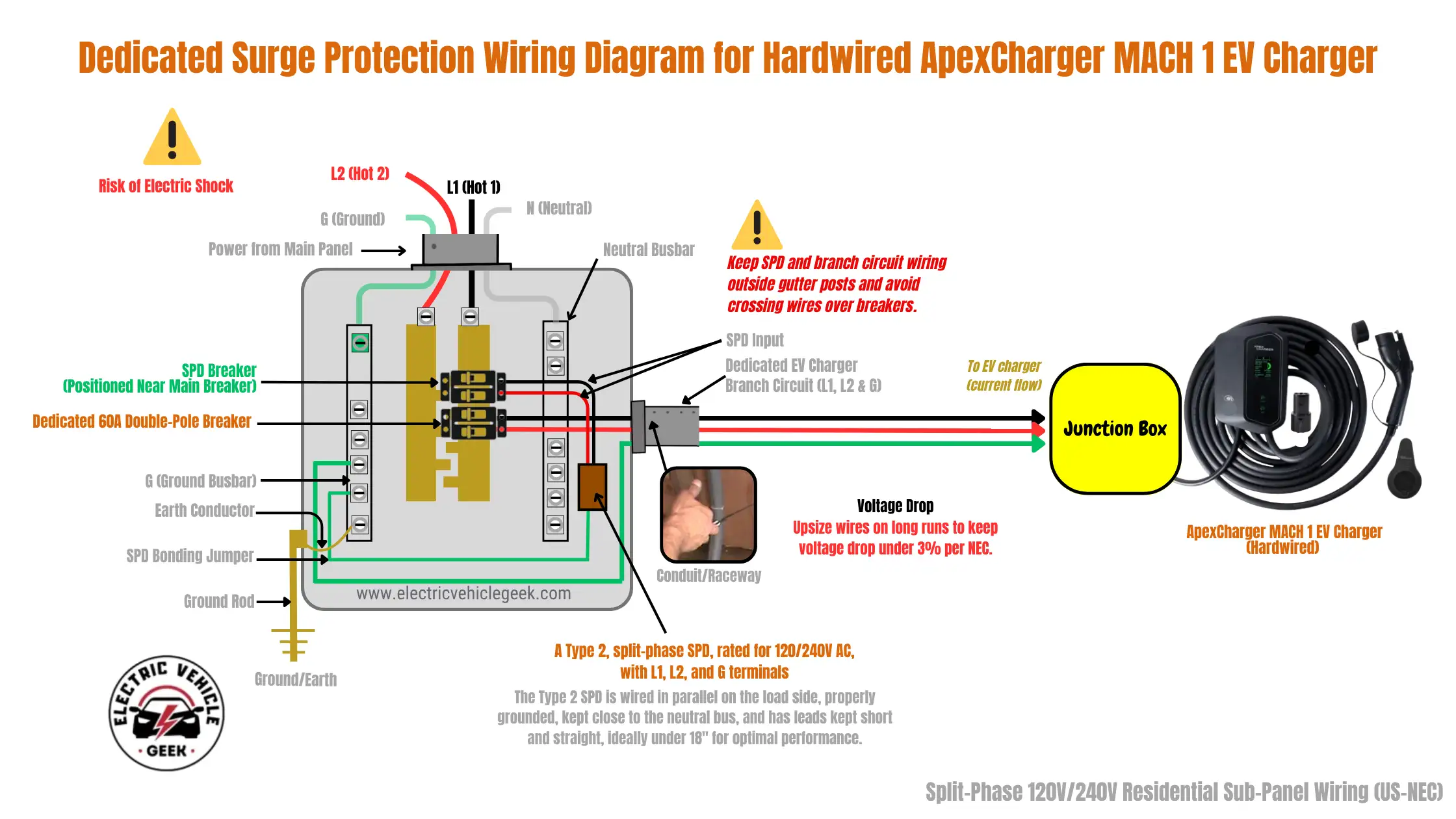
Since the branch circuit for hardwired ApexCharger MACH 1 EV charger installations does not include a neutral conductor, the SPD is connected across L1 and L2, with the ground wire bonded to the subpanel’s ground busbar. This 3-wire configuration matches the three-conductor feed and provides effective surge protection for the ApexCharger MACH 1.
ApexCharger MACH 1 EV Charger Ease of Use & Compatibility
The ApexCharger MACH 1 EV Charger strikes a strong balance between simplicity and smart functionality. Setup is seamless – whether you’re using the NEMA 14-50 plug or opting for a hardwired installation, the unit auto-detects voltage depending on your home electricity loads and EV charging loads assigned to the ApexCharger MACH 1 EV charger branch circuit and adjusted accordingly unlike EV chargers such as the Wallbox Pulsar Plus which require additional devices (Wallbox Power Meter) installed in the electrical panel for EV charging load management. The included Tesla PRO 1 NACS adapter is robust and fits securely, enabling direct charging for Tesla vehicles without requiring additional accessories or third-party converters.
User interaction is centered around a 2.4-inch LED display, which shows essential charging stats clearly without overwhelming the user. Paired with the Smart Life available on Android and iOS, users can schedule charging sessions, monitor energy use, and adjust settings with ease. RFID access cards offer simple authorization for multi-user scenarios.
Compared to its higher-tier sibling, the ApexCharger MACH 2, the MACH 1 trades premium smart EV charging features for affordability. The MACH 2 features a 5.7-inch high-resolution display, enabling more in-depth interaction with charging data, and introduces “Talking in Colors” – a 360° LED ring that visually communicates charging status, errors, and standby states at a glance. While MACH 1 offers core smart charging functions without much detailed visuals on the EV charger display, the MACH 2 caters to users who want a more dynamic and informative interface.
Still, the MACH 1’s long, pliable 30-foot cable, durable build, and intuitive app control make it a user-friendly choice that doesn’t sacrifice performance. It’s especially convenient for users with larger garages, renters, or those with hard-to-reach outlets.
ApexCharger MACH 1 EV Charger Performance
In my tests, the ApexCharger MACH 1 EV Charger delivered consistent charging speeds close to the rated maximum:
- 40A NEMA 14-50 outlet: ~9.6 kW (up to 35–38 miles of range per hour)
- 48A hardwired: ~11.5 kW (up to 44 miles of range per hour)
Charging was stable, with no overheating, throttling, or tripping the GFCI dedicated EV charger circuit breaker even after several consecutive full sessions. The onboard display clearly showed session data, and the app mirrored this in real time, great for tracking energy costs and usage history.
ApexCharger MACH 1 EV Charger Portability
While the ApexCharger MACH 1 EV Charger isn’t designed as a travel charger, it can technically be relocated when installed using a NEMA 14-50 plug. This setup offers some flexibility for long-term rentals or emergency use. However, due to its size, weight, and wall-mounted design, the MACH 1 is best treated as a semi-permanent home installation.
If portability is a priority, we recommend the ApexCharger MACH 3 EV Charger. It’s smaller, lighter, and supports dual-voltage (120V and 240V), making it far more versatile for travel, temporary use, or situations where only a standard household outlet is available.
In short, the MACH 1 is a reliable home charging solution, but for portable EV charging, the MACH 3 is the better fit.
ApexCharger MACH 1 EV Charger Safety Features
The ApexCharger MACH 1 EV Charger includes a full suite of safety protections: overvoltage, undervoltage, overcurrent, overheating, short-circuit, ground fault, and surge protection. The unit meets or exceeds the latest UL and CSA standards, and includes an anti-theft locking bolt – a useful addition for outdoor installations.
The light assist indicators and intuitive fault messaging on the display make diagnosing any issues quick and easy.
The ApexCharger MACH 1 Level 2 EV Charger includes RFID access control and comes with two security RFID cards. Comparable chargers like the Autel Maxcharger offer similar security features but cost nearly twice as much, making the MACH 1 a compelling, budget-friendly alternative for EV owners seeking RFID-enabled charging without the premium price tag.
Smart Features & App Integration
The Smart Life App integration worked flawlessly with the ApexCharger MACH 1 EV Charger in my testing. It connected via Wi-Fi and Bluetooth, allowing local and remote control of all key functions including:
- Charge scheduling (daily/weekly)
- Real-time monitoring
- Adjustable amperage
- Historical energy reports
This level of control puts it ahead of other smart chargers in its class, especially for users managing multiple vehicles or charging based on TOU rates.
Customer Feedback
Customer reviews have been overwhelmingly positive, especially from users who have bought the ApexCharger MACH 1 EV Charger through the company website where more than 3,000 reviews exist. Verified buyers cite the MACH 1’s robust build, smart features, and Tesla compatibility as major advantages. The long 30ft cable, reliable app, and 24/7 US-based support also receive frequent praise. The included NACS adapter is highlighted often as a feature that saves money and hassle.
Who Should Buy This Charger?
- Homeowners with multiple EVs or high daily mileage who need fast, reliable charging
- Tesla owners seeking a J1772-compatible universal charger
- Property managers, landlords, or small business owners looking for a shared-use charging solution with access control
- EV drivers in TOU regions who want to optimize charging costs using smart scheduling
Specification: ApexCharger MACH 1 EV Charger Review
| Charging Specifications | ||||||||
|---|---|---|---|---|---|---|---|---|
| ||||||||
| Electrical & Power Specifications | ||||||||
| ||||||||
| Cable & Connector Specifications | ||||||||
| ||||||||
| Connectivity & Smart Features | ||||||||
| ||||||||
| Certifications & Safety Standards | ||||||||
| ||||||||
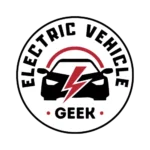
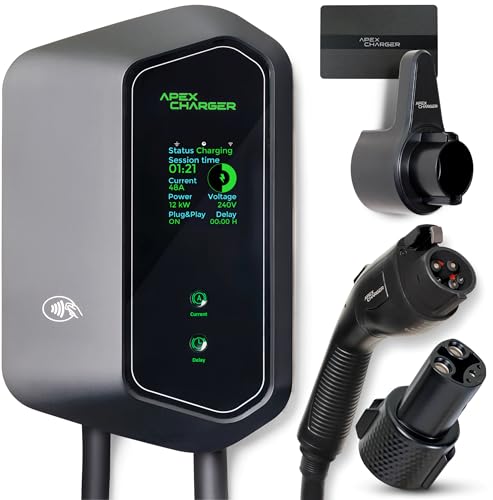
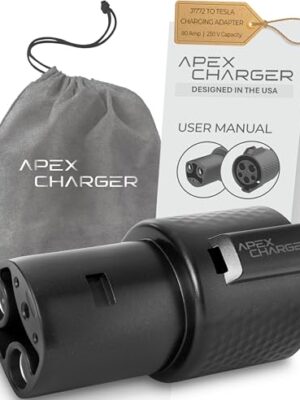
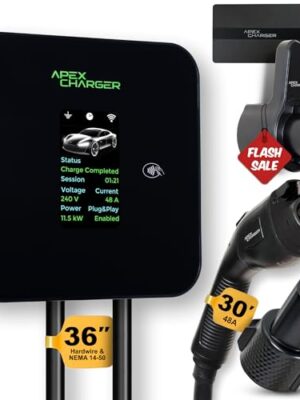
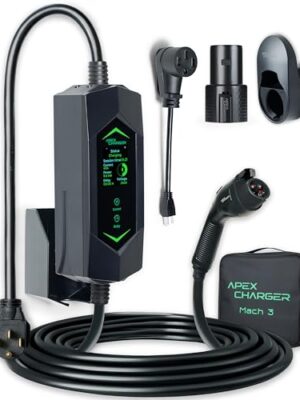
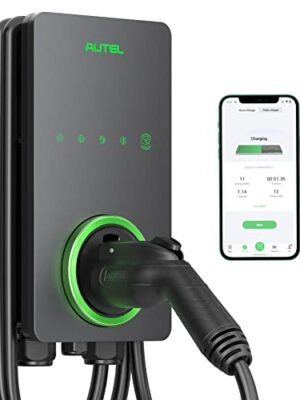

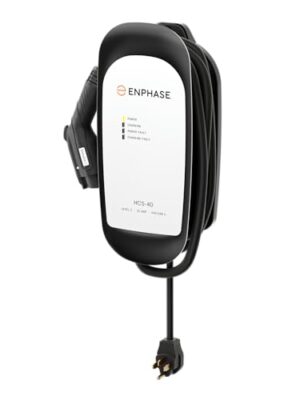
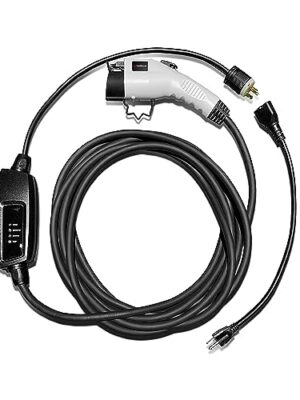
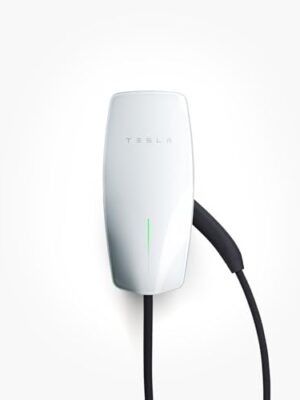
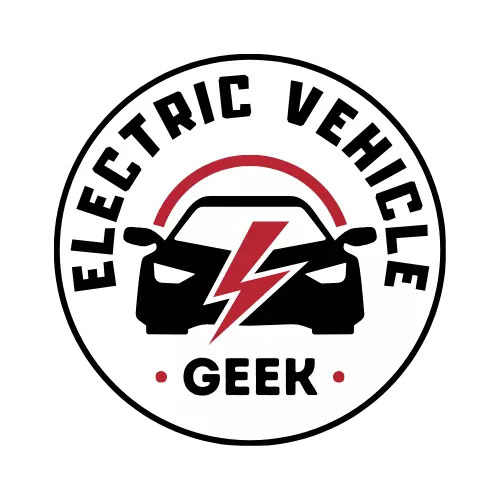
There are no reviews yet.